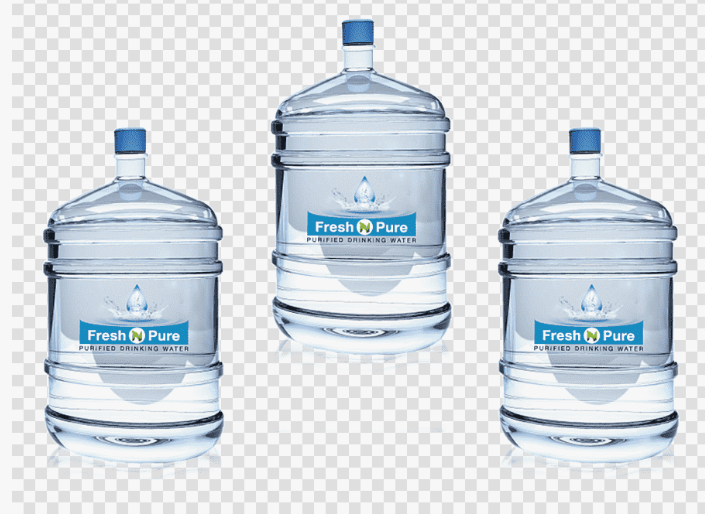When it comes to staying hydrated, convenience and cost are two important factors that guide our choices. Whether you are at home, in the office, or travelling, you’ve likely encountered the classic debate: is it better to opt for a 5-gallon water jug or stick with individual bottled water? With a range of options available, it’s essential to evaluate not only the financial implications but also the practicality of each.
In this comprehensive comparison, we’ll break down the differences between 5-gallon water jugs and bottled water to help you make an informed choice. We'll also touch on related considerations like how many water bottles equal 5 gallons, lightweight water bottles for travel, and eco-friendly alternatives like small steel water bottles with flip tops.
Understanding 5-Gallon Water Jugs
A 5-gallon water jug is a large, reusable container typically used with a water dispenser. These jugs are designed for refillable use and are common in homes, offices, and gyms.
Key Advantages of 5-Gallon Water Jugs
- Cost Efficiency: Purchasing water in bulk through a 5-gallon jug system is generally cheaper over time compared to buying individual bottles. Refilling a jug costs less per gallon than purchasing the equivalent amount of water in smaller bottles.
- Environmental Impact: A single 5-gallon jug reduces plastic waste dramatically compared to the dozens or even hundreds of single-use water bottles it replaces.
- Convenience for High Consumption: For families or workplaces with high water consumption, 5-gallon jugs ensure a steady supply without constant re-purchasing.
Potential Downsides
- Storage Space: These jugs are large and may require more space compared to cases of bottled water.
- Initial Equipment Costs: Many 5-gallon jugs require a water dispenser, which adds to the initial investment.
- Portability: They are heavy, weighing around 40 pounds when full, making them impractical for travel or outdoor activities.
Breaking Down Bottled Water
Bottled water comes in a variety of sizes, including 16.9-ounce bottles often purchased in multipacks.
Key Advantages of Bottled Water
- Portability: Bottled water is lightweight and easy to carry, making it the perfect option for outdoor activities, travel, and personal hydration on the go.
- Convenience: With bottled water, there’s no need for additional equipment or storage space. It’s ready to drink straight from the bottle.
- Accessibility: Available almost everywhere, bottled water provides an easy solution in situations where clean drinking water is not readily available.
Potential Downsides
- Cost Over Time: Individually packaged bottled water is significantly more expensive per gallon than bulk alternatives like 5-gallon jugs.
- Environmental Impact: The production, transportation, and disposal of single-use plastic bottles contribute significantly to plastic pollution.
- Health Considerations: While most bottled water is safe, concerns have been raised about the leaching of chemicals from certain plastics when exposed to heat.
Cost Comparison
To better illustrate the cost differences, consider this calculation:
- 5-Gallon Water Jug:
- A refillable 5-gallon jug typically costs $1 to $2 per refill (varies by location).
- This translates to $0.20 to $0.40 per gallon.
- Bottled Water (16.9 oz bottles):
- A case of 24 bottles (roughly 3.17 gallons) costs around $5 to $7.
- This translates to $1.57 to $2.21 per gallon.
If you consume 10 gallons of water per month, the savings of using a 5-gallon jug become apparent over time:
- 5-Gallon Jug: $2 to $4 monthly.
- Bottled Water: $15.70 to $22.10 monthly.
How Many Water Bottles Is 5 Gallons?
To better understand the scale, let’s break it down:
- One gallon equals 128 fluid ounces.
- A standard bottled water container holds 16.9 fluid ounces.
- Therefore, 5 gallons is equivalent to approximately 38 standard 16.9-ounce bottles.
Lightweight and Eco-Friendly Options
If portability and environmental sustainability are key concerns, here are some alternatives:
1. Small Steel Water Bottle with Flip Top
A small steel water bottle with a flip top is a reusable, eco-friendly option perfect for travel or personal hydration. Its durable design minimizes the need for disposable plastics, and the flip-top feature adds ease of use for active lifestyles.
2. Lightweight Water Bottles for Travel
Look for collapsible or lightweight BPA-free water bottles for travel. These are especially practical for hikers, campers, or those frequently on the go.
Practical Considerations
When deciding between 5-gallon water jugs and bottled water, consider the following:
Usage Volume
- For large households, offices, or gyms, a 5-gallon jug is often the better choice due to the cost efficiency and steady supply it provides.
- For individuals or small households, bottled water or reusable bottles might be more convenient.
Storage and Equipment
- If you have the space and equipment for a 5-gallon water dispenser, it’s a more economical and eco-friendly choice.
- Without the necessary storage space or equipment, bottled water or a reusable lightweight bottle is more practical.
Eco-Friendly Practices
- Opt for recyclable options or reusable water bottles whenever possible.
- Consider investing in a water filtration system at home to reduce reliance on plastic packaging.
FAQs
1. How many 16.9 oz water bottles equal 5 gallons?
Approximately 38 bottles equal 5 gallons. This calculation highlights the waste generated by single-use bottled water versus reusable jugs.
2. Are 5-gallon water jugs safe to reuse?
Yes, most 5-gallon water jugs are made of durable, food-grade plastic and designed for repeated use. Regular cleaning and sanitizing are recommended.
3. What is the best option for travel hydration?
For travel, lightweight options such as collapsible bottles or small steel water bottles with a flip top are ideal. They are easy to carry, eco-friendly, and reusable.
Conclusion
When comparing the cost-effectiveness of 5-gallon water jugs and bottled water, it’s clear that 5-gallon jugs offer significant savings over time and minimize environmental impact. However, for on-the-go convenience, bottled water or lightweight, reusable bottles may be more practical. By assessing your usage habits, space, and priorities, you can make a choice that fits both your lifestyle and budget.





Comments